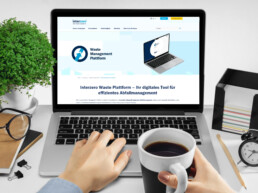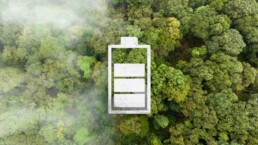With the new EU Battery Regulation, Europe is entering a new era of sustainable product responsibility. Its core is a comprehensive life cycle approach that, for the first time, regulates all phases of battery production – from raw material extraction through production and use to collection, reuse, and recycling.
The regulation not only replaces the previous EU Directive 2006/66/EC, but also raises the requirements to a new level – with concrete obligations, labeling requirements, and reporting obligations. Learn what applies in Austria and what you need to pay attention to here.
The most important changes to the new EU Battery Regulation at a glance:
- New battery categories: In the future, there will be five battery categories. In addition to device, automotive, and industrial batteries, batteries for light transport (LV) and batteries for electric vehicles (EV) will be introduced.
- Holistic life cycle approach : Companies bear responsibility across the entire life cycle – from production to disposal.
- CO2 footprint : Maximum CO₂ footprint values will apply in the future for industrial, LV and electric vehicle batteries.
- Recycled content : From 2031, minimum recycled content will be required for industrial, LV and electric vehicle batteries, e.g., 16% cobalt and 6% lithium.
- Performance standards: From 2027, new minimum requirements for durability, capacity and internal resistance will apply to some battery categories.
- Easy removal and replaceability: From February 18, 2027, portable batteries must be easily removed and replaced by the end user (except in exceptional cases).
- Labeling requirements : From August 18, 2026, batteries must be labeled in detail. From 2027, a QR code with a digital battery passport will follow for larger LV and industrial batteries (> 2 kWh) and electric vehicle batteries.
- Due diligence obligations : From 2025, companies with a turnover of more than €40 million must consider the impacts of the procurement, processing and trade of raw materials required for battery production.
From 2026 – new reporting obligations under the EU Battery Regulation
The new regulation also brings extensive changes to the Austrian reporting system. Existing categories are being revised and new categories are being introduced. The final version of the reporting categories is currently being coordinated:
- Monthly reporter : from 01/2026
- Quarterly reporter : from Q1/2026
- Annual reporter : Report for the year 2026 Flat rate reporters are also affected – an adjustment of the flat rates is currently being prepared.
Schedule – Here is an overview of the most important deadlines:
- 18.08.2024: Obligation to carry out conformity assessment
- 18.08.2025: Due diligence obligations & EPR mandatory
- 18.08.2026: Labeling requirements come into force
- 18.02.2027: QR code & battery passport mandatory
- 18.08.2027: Minimum standards for battery performance
- 18.08.2028: Declaration of recycled content required
- 18.08.2031: Minimum recycled material quotas mandatory
- 18.08.2036: Increase in recycled content
Which battery categories are affected by the new EU Battery Regulation?
- Portable batteries (under 5 kg, neither for LV, starter or electric vehicle batteries)
- Starter batteries (e.g. for cars)
- Industrial batteries (over 5 kg, not EV or LV)
- NEW: LV batteries (for light electric vehicles under 25 kg)
- NEW: Electric vehicle batteries (> 25 kg for hybrid and electric vehicles)
Our service for your company:
Our expertise lies in the rapid, straightforward, and practical implementation of the new requirements. Batteries must be collected, taken back, and recycled after they are placed on the market. Transfer your obligations for the take-back and recycling of device, vehicle, or industrial batteries in Austria to Interzero Austria – reliably, legally compliant, and efficiently.
Your advantages with us:
- our many years of experience in product responsibility,
- individual support from our experts,
- clear support in converting your reporting systems,
- sound advice on reporting, labeling and take-back obligations.
Our solutions for secure compliance of your batteries:
All details about the commitment and redemption at Interzero can be found here: Battery licensing
Also relevant for Austria:
- National implementation of the EU regulation is no longer necessary – it applies directly .
- Austria is responsible for supplementary regulations, such as the Battery Accompanying Act , which is currently still being coordinated and regulates points regarding the collection and return of used batteries in detail.
- Documentation requirements are increasing significantly – for example through QR codes and battery passports.
- The requirements for collection and recycling are increasing – including stricter documentation requirements .
Would you like to know which specific steps are necessary for your company?
Take advantage of our free webinars or get individual advice.
Latest News

A concept for your waste:
Save time, money and space

Your holistic environmental service provider:
Everything from a single source

Interzero & Bienenfink:
Together for biodiversity
About Interzero:
Interzero is one of the leading service providers for closing product, material, and logistics cycles, as well as an innovation leader in plastics recycling with the largest sorting capacity in Europe. Under the guiding principle of “zero waste solutions,” the company supports over 80,000 customers across Europe in the responsible handling of recyclable materials, helping them improve their own sustainability performance and conserve primary resources. With around 2,000 employees, the company generates sales of over one billion euros (2021). According to Fraunhofer UMSICHT, Interzero’s recycling activities saved 1.2 million tons of greenhouse gases and 11.1 million tons of primary raw materials compared to primary production in 2023 alone. As a pioneer of the circular economy, Interzero is the recipient of the 2024 German Sustainability Award and the associated special prize in the transformation field of “Resources.” Further information can be found at www.interzero.at .
Find out more in our current brochure on ” resources SAVED by recycling “

